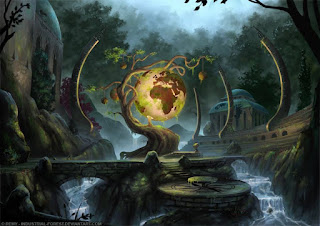 |
| The Mysterious Globe |
1. Other Genres
To see what other writers are doing within their respective genres. I usually only write fantasy, but it would be interesting to talk to writers who prefer mystery, adventure, romance, or other topics.
2. Networking
It doesn't hurt to meet other authors, make friends / new colleagues within the industry, and then later keep tabs with them. And this can be very beneficial.
"Networking is key. Almost every author I know—and certainly myself included—can trace their publishing success back to someone they met at a writers conference. If you want to get published, I can’t think of any better advice." - James Dashner, author of 'The Maze Runner'
3. Co-Writing / Collaboration
I would love to meet an author with similar tastes to my own and co-write a book together. Maybe not something like the Trillium Series - the infamous collaboration of Marion Zimmer Bradley, Julian May, and Andre Norton - as critics panned it for being poorly executed. Too many chefs in the kitchen in that one. But it would be nice to collaborate with one other author and see what we can cook together.
eg. If I met a mystery writer who enjoys fantasy perhaps we could work on a "fantasy mystery" together. The detective in the story could be a mysterious creature with special abilities that make it a better sleuth.
4. Meeting Publishers
Publishers are a tricky lot. Some of them are looking for specific things and thus reject anything that doesn't fulfill their preset criteria of what they are looking for. Meeting publishers in person you can ask them "Hey, what are actually looking for?" and they can just tell you. Then, if you're lucky, you can pitch them an idea you've had for a standalone book or a series and see how they feel about it.
5. Marketing
Sometimes other authors will spill on the marketing tips, especially if they know you write in a different genre. A romance author isn't going to care so much about spilling their marketing techniques to another author who writes horror.
6. Learn Something.
You will probably learn something. Not necessarily about the craft of storytelling, but also important details about the industry. You might learn the best way to get a literary agent, how to avoid book publishing scams (they take your money and make copies of your work, sure, but they also just took the rights to book, including film and TV rights). You might learn how easy it is to self-publish and skip the traditional publishing industry. You might learn how to build an author platform. And many more things that you could in theory learn online, but if you don't know what to search for how would you know what to type? Being at a conference would be a crash course in many of things you haven't even heard about.
7. Find an Agent
One of the things authors can do at conferences is to pitch their writing projects at agents. Normally this is done by email / snail mail, but at a conference it is possibly to sign up to get 5 minutes with an agent and pitch your book with them. If they like your pitch then they will request to see more of your work. With luck you could find yourself with an agent and later a publisher.
In Toronto Canada? Here is a few sites to check out:
https://www.dreamerswriting.com/creative/canadian-writing-conferences/
https://torontowritingworkshop.com/
https://festivalofauthors.ca/













